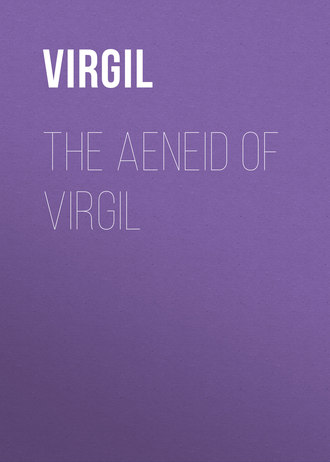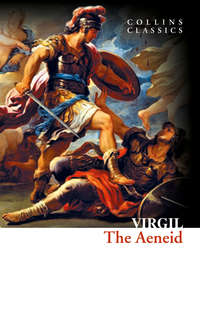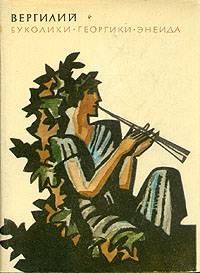 полная версия
полная версияThe Aeneid of Virgil
What god may now unfold for me in verse so many woes, so many diverse slaughters and death of captains whom now Turnus, now again the Trojan hero, drives over all the field? Was it well, O God, that nations destined to everlasting peace should clash in so vast a shock? Aeneas meets Sucro the Rutulian; the combat stayed the first rush of the Teucrians, but delayed them not long; he catches him on the side, and, when fate comes quickest, drives the harsh sword clean through the ribs where they fence the breast. Turnus brings down Amycus from horseback with his brother Diores, and meets them on foot; him he strikes with his long spear as he comes, him with his sword-point, and hangs both severed heads on his chariot and carries them off dripping with blood. The one sends to death Talos and Tanaïs and brave Cethegus, three at one meeting, and gloomy Onites, of Echionian name, and Peridia the mother that bore him; the other those brethren sent from Lycia and Apollo's fields, and Menoetes the Arcadian, him who loathed warfare in vain; who once had his art and humble home about the river-fisheries of Lerna, and knew not the courts of the great, but his father was tenant of the land he tilled. And as fires kindled dispersedly in a dry forest and rustling laurel-thickets, or foaming rivers where they leap swift and loud from high hills, and speed to sea each in his own path of havoc; as fiercely the two, Aeneas and Turnus, dash amid the battle; now, now wrath surges within them, and unconquerable hearts are torn; now in all their might they rush upon wounds. The one dashes Murranus down and stretches him on the soil with a vast whirling mass of rock, as he cries the names of his fathers and forefathers of old, a whole line drawn through Latin kings; under traces and yoke the wheels spurned him, and the fast-beating hoofs of his rushing horses trample down their forgotten lord. The other meets Hyllus rushing on in gigantic pride, and hurls his weapon at his gold-bound temples; the spear pierced through the helmet and stood fast in the brain. Neither did thy right hand save thee from Turnus, O Cretheus, bravest of the Greeks; nor did his gods shield Cupencus when Aeneas came; he gave his breast full to the steel, nor, alas! was the brazen shield's delay aught of avail. Thee likewise, Aeolus, the Laurentine plains saw sink backward and cover a wide space of earth; thou fallest, whom Argive battalions could not lay low, nor Achilles the destroyer of Priam's realm. Here was thy goal of death; thine high house was under Ida, at Lyrnesus thine high house, on Laurentine soil thy tomb. The whole battle-lines gather up, all Latium and all Dardania, Mnestheus and valiant Serestus, with Messapus, tamer of horses, and brave Asilas, the Tuscan battalion and Evander's Arcadian squadrons; man by man they struggle with all their might; no rest nor pause in the vast strain of conflict.
At this Aeneas' mother most beautiful inspired him to advance on the walls, directing his columns on the town and dismaying the Latins with sudden and swift disaster. As in search for Turnus he bent his glance this way and that round the separate ranks, he descries the city free from all this warfare, unpunished and unstirred. Straightway he kindles at the view of a greater battle; he summons Mnestheus and Sergestus and brave Serestus his captains, and mounts a hillock; there the rest of the Teucrian army gathers thickly, still grasping shield and spear. Standing on the high mound amid them, he speaks: 'Be there no delay to my words; Jupiter is with us; neither let any be slower to move that the design is sudden. This city to-day, the source of war, the royal seat of Latinus, unless they yield them to receive our yoke and obey their conquerors, will I raze to ground, and lay her smoking roofs level with the dust. Must I wait forsooth till Turnus please to stoop to combat, and choose again to face his conqueror? This, O citizens, is the fountain-head and crown of the accursed war. Bring brands speedily, and reclaim the treaty in fire.' He ended; all with spirit alike emulous form a wedge and advance in serried masses to the walls. Ladders are run up, and fire leaps sudden to sight. Some rush to the separate gates, and cut down the guards of the entry, others hurl their steel and darken the sky with weapons. Aeneas himself among the foremost, upstretching his hand to the city walls, loudly reproaches Latinus, and takes the gods to witness that he is again forced into battle, that twice now do the Italians choose warfare and break a second treaty. Discord rises among the alarmed citizens: some bid unbar the town and fling wide their gates to the Dardanians, and pull the king himself towards the ramparts; others bring arms and hasten to defend the walls: as when a shepherd tracks bees to their retreat in a recessed rock, and fills it with stinging smoke, they within run uneasily up and down their waxen fortress, and hum louder in rising wrath; the smell rolls in darkness along their dwelling, and a blind murmur echoes within the rock as the smoke issues to the empty air.
This fortune likewise befell the despairing Latins, this woe shook the whole city to her base. The queen espies from her roof the enemy's approach, the walls scaled and firebrands flying on the houses; and nowhere Rutulian ranks, none of Turnus' columns to meet them; alas! she deems him destroyed in the shock of battle, and, distracted by sudden anguish, shrieks that she is the source of guilt, the spring of ill, and with many a mad utterance of frenzied grief rends her purple attire with dying hand, and ties from a lofty beam the ghastly noose of death. And when the unhappy Latin women knew this calamity, first her daughter Lavinia tears her flower-like tresses and roseate cheeks, and all the train around her madden in her suit; the wide palace echoes to their wailing, and from it the sorrowful rumour spreads abroad throughout the town. All hearts sink; Latinus goes with torn raiment, in dismay at his wife's doom and his city's downfall, defiling his hoary hair with soilure of sprinkled dust.
Meanwhile on the skirts of the field Turnus chases scattered stragglers, ever slacker to battle, ever less and less exultant in his coursers' victorious speed. The confused cry came to him borne in blind terror down the breeze, and his startled ears caught the echoing tumult and disastrous murmur of the town. 'Ah me! what agony shakes the city? or what is this cry that fleets so loud from the distant town?' So speaks he, and distractedly checks the reins. And to him his sister, as changed into his charioteer Metiscus' likeness she swayed horses and chariot-reins, thus rejoined: 'This way, Turnus, let us pursue the brood of Troy, where victory opens her nearest way; there are others whose hands can protect their dwellings. Aeneas falls fiercer on the Italians, and closes in conflict; let our hand too deal pitiless death on his Teucrians. Neither in tale of dead nor in glory of battle shalt thou retire outdone.' Thereat Turnus: . . .
'Ah my sister, long ere now I knew thee, when first thine arts shattered the treaty, and thou didst mingle in the strife; and now thy godhead conceals itself in vain. But who hath bidden thee descend from heaven to bear this sore travail? was it that thou mightest see thy hapless brother cruelly slain? for what do I, or what fortune yet gives promise of safety? Before my very eyes, calling aloud on me, I saw Murranus, than whom none other is left me more dear, sink huge to earth, borne down by as huge a wound. Hapless Ufens is fallen, not to see our shame; corpse and armour are in Teucrian hands. The destruction of their households, this was the one thing yet lacking; shall I suffer it? Shall my hand not refute Drances' jeers? shall I turn my back, and this land see Turnus a fugitive? Is Death all so bitter? Do you, O Shades, be gracious to me, since the powers of heaven are estranged; to you shall I go down, a pure spirit and ignorant of your blame, never once unworthy of my mighty fathers of old.'
Scarce had he spoken thus; lo! Saces, borne flying on his foaming horse through the thickest of the foe, an arrow-wound right in his face, darts, beseeching Turnus by his name. 'Turnus, in thee is our last safety; pity thy people. Aeneas thunders in arms, and threatens to overthrow and hurl to destruction the high Italian fortress; and already firebrands are flying on our roofs. On thee, on thee the Latins turn their gazing eyes; King Latinus himself mutters in doubt, whom he is to call his sons, to whom he shall incline in union. Moreover the queen, thy surest stay, hath fallen by her own hand and in dismay fled the light. Alone in front of the gates Messapus and valiant Atinas sustain the battle-line. Round about them to right and left the armies stand locked and the iron field shivers with naked points; thou wheelest thy chariot on the sward alone.' At the distracting picture of his fortune Turnus froze in horror and stood in dumb gaze; together in his heart sweep the vast mingling tides of shame and maddened grief, and love stung to frenzy and resolved valour. So soon as the darkness cleared and light returned to his soul, he fiercely turned his blazing eyeballs towards the ramparts, and gazed back from his wheels on the great city. And lo! a spire of flame wreathing through the floors wavered up skyward and held a turret fast, a turret that he himself had reared of mortised planks and set on rollers and laid with high gangways. 'Now, O my sister, now fate prevails: cease to hinder; let us follow where deity and stern fortune call. I am resolved to face Aeneas, resolved to bear what bitterness there is in death; nor shalt thou longer see me shamed, sister of mine. Let me be mad, I pray thee, with this madness before the end.' He spoke, and leapt swiftly from his chariot to the field, and darting through weapons and through enemies, leaves his sorrowing sister, and bursts in rapid course amid their columns. And as when a rock rushes headlong from some mountain peak, torn away by the blast, or if the rushing rain washes it away, or the stealing years loosen its ancient hold; the reckless mountain mass goes sheer and impetuous, and leaps along the ground, hurling with it forests and herds and men; thus through the scattering columns Turnus rushes to the city walls, where the earth is wettest with bloodshed and the air sings with spears; and beckons with his hand, and thus begins aloud: 'Forbear now, O Rutulians, and you, Latins, stay your weapons. Whatsoever fortune is left is mine: I singly must expiate the treaty for you all, and make decision with the sword.' All drew aside and left him room.
But lord Aeneas, hearing Turnus' name, abandons the walls, abandons the fortress height, and in exultant joy flings aside all hindrance, breaks off all work, and clashes his armour terribly, vast as Athos, or as Eryx, or as the lord of Apennine when he roars with his tossing ilex woods and rears his snowy crest rejoicing into air. Now indeed Rutulians and Trojans and all Italy turned in emulous gaze, and they who held the high city, and they whose ram was battering the foundations of the wall, and unarmed their shoulders. Latinus himself stands in amaze at the mighty men, born in distant quarters of the world, met and making decision with the sword. And they, in the empty level field that cleared for them, darted swiftly forward, and hurling their spears from far, close in battle shock with clangour of brazen shields. Earth utters a moan; the sword-strokes fall thick and fast, chance and valour joining in one. And as in broad Sila or high on Taburnus, when two bulls rush to deadly battle forehead to forehead, the herdsmen retire in terror, all the herd stands dumb in dismay, and the heifers murmur in doubt which shall be lord in the woodland, which all the cattle must follow; they violently deal many a mutual wound, and gore with their stubborn horns, bathing their necks and shoulders in abundant blood; all the woodland moans back their bellowing: even thus Aeneas of Troy and the Daunian hero rush together shield to shield; the mighty crash fills the sky. Jupiter himself holds up the two scales in even balance, and lays in them the different fates of both, trying which shall pay forfeit of the strife, whose weight shall sink in death. Turnus darts out, thinking it secure, and rises with his whole reach of body on his uplifted sword; then strikes; Trojans and Latins cry out in excitement, and both armies strain their gaze. But the treacherous sword shivers, and in mid stroke deserts its eager lord. If flight aid him not now! He flies swifter than the wind, when once he descries a strange hilt in his weaponless hand. Rumour is that in his headlong hurry, when mounting behind his yoked horses to begin the battle, he left his father's sword behind and caught up his charioteer Metiscus' weapon; and that served him long, while Teucrian stragglers turned their backs; when it met the divine Vulcanian armour, the mortal blade like brittle ice snapped in the stroke; the shards lie glittering upon the yellow sand. So in distracted flight Turnus darts afar over the plain, and now this way and now that crosses in wavering circles; for on all hands the Teucrians locked him in crowded ring, and the dreary marsh on this side, on this the steep city ramparts hem him in.
Therewith Aeneas pursues, though ever and anon his knees, disabled by the arrow, hinder and stay his speed; and foot hard on foot presses hotly on his hurrying enemy: as when a hunter courses with a fleet barking hound some stag caught in a river-loop or girt by the crimson-feathered toils, and he, in terror of the snares and the high river-bank, darts back and forward in a thousand ways; but the keen Umbrian clings agape, and just catches at him, and as though he caught him snaps his jaws while the baffled teeth close on vacancy. Then indeed a cry goes up, and banks and pools answer round about, and all the sky echoes the din. He, even as he flies, chides all his Rutulians, calling each by name, and shrieks for the sword he knew. But Aeneas denounces death and instant doom if one of them draw nigh, and doubles their terror with threats of their city's destruction, and though wounded presses on. Five circles they cover at full speed, and unwind as many this way and that; for not light nor slight is the prize they seek, but Turnus' very lifeblood is at issue. Here there haply had stood a bitter-leaved wild olive, sacred to Faunus, a tree worshipped by mariners of old; on it, when rescued from the waves, they were wont to fix their gifts to the god of Laurentum and hang their votive raiment; but the Teucrians, unregarding, had cleared away the sacred stem, that they might meet on unimpeded lists. Here stood Aeneas' spear; hither borne by its own speed it was held fast stuck in the tough root. The Dardanian stooped over it, and would wrench away the steel, to follow with the weapon him whom he could not catch in running. Then indeed Turnus cries in frantic terror: 'Faunus, have pity, I beseech thee! and thou, most gracious Earth, keep thy hold on the steel, as I ever have kept your worship, and the Aeneadae again have polluted it in war.' He spoke, and called the god to aid in vows that fell not fruitless. For all Aeneas' strength, his long struggling and delay over the tough stem availed not to unclose the hard grip of the wood. While he strains and pulls hard, the Daunian goddess, changing once more into the charioteer Metiscus' likeness, runs forward and passes her brother his sword. But Venus, indignant that the Nymph might be so bold, drew nigh and wrenched away the spear where it stuck deep in the root. Erect in fresh courage and arms, he with his faithful sword, he towering fierce over his spear, they face one another panting in the battle shock.
Meanwhile the King of Heaven's omnipotence accosts Juno as she gazes on the battle from a sunlit cloud. 'What yet shall be the end, O wife? what remains at the last? Heaven claims Aeneas as his country's god, thou thyself knowest and avowest to know, and fate lifts him to the stars. With what device or in what hope hangest thou chill in cloudland? Was it well that a deity should be sullied by a mortal's wound? or that the lost sword—for what without thee could Juturna avail?—should be restored to Turnus and swell the force of the vanquished? Forbear now, I pray, and bend to our entreaties; let not the pain thus devour thee in silence, and distress so often flood back on me from thy sweet lips. The end is come. Thou hast had power to hunt the Trojans over land or wave, to kindle accursed war, to put the house in mourning, and plunge the bridal in grief: further attempt I forbid thee.' Thus Jupiter began: thus the goddess, daughter of Saturn, returned with looks cast down:
'Even because this thy will, great Jupiter, is known to me for thine, have I left, though loth, Turnus alone on earth; nor else wouldst thou see me now, alone on this skyey seat, enduring good and bad; but girt in flame I were standing by their very lines, and dragging the Teucrians into the deadly battle. I counselled Juturna, I confess it, to succour her hapless brother, and for his life's sake favoured a greater daring; yet not the arrow-shot, not the bending of the bow, I swear by the merciless well-head of the Stygian spring, the single ordained dread of the gods in heaven. And now I retire, and leave the battle in loathing. This thing I beseech thee, that is bound by no fatal law, for Latium and for the majesty of thy kindred. When now they shall plight peace with prosperous marriages (be it so!), when now they shall join in laws and treaties, bid thou not the native Latins change their name of old, nor become Trojans and take the Teucrian name, or change their language, or alter their attire: let Latium be, let Alban kings endure through ages, let Italian valour be potent in the race of Rome. Troy is fallen; let her and her name lie where they fell.'
To her smilingly the designer of men and things:
'Jove's own sister thou art, and second seed of Saturn, such surge of wrath tosses within thy breast! But come, allay this madness so vainly stirred. I give thee thy will, and yield thee ungrudged victory. Ausonia shall keep her native speech and usage, and as her name is, it shall be. The Trojans shall sink mingling into their blood; I will add their sacred law and ritual, and make all Latins and of a single speech. Hence shall spring a race of tempered Ausonian blood, whom thou shalt see outdo men and gods in duty; nor shall any nation so observe thy worship.' To this Juno assented, and in gladness withdrew her purpose; meanwhile she quits her cloud, and retires out of the sky.
This done, the Father revolves inly another counsel, and prepares to separate Juturna from her brother's arms. Twin monsters there are, called the Dirae by their name, whom with infernal Megaera the dead of night bore at one single birth, and wreathed them in like serpent coils, and clothed them in windy wings. They appear at Jove's throne and in the courts of the grim king, and quicken the terrors of wretched men whensoever the lord of heaven deals sicknesses and dreadful death, or sends terror of war upon guilty cities. One of these Jupiter sent swiftly down from heaven's height, and bade her meet Juturna for a sign. She wings her way, and darts in a whirlwind to earth. Even as an arrow through a cloud, darting from the string when Parthian hath poisoned it with bitter gall, Parthian or Cydonian, and sped the immedicable shaft, leaps through the swift shadow whistling and unknown; so sprung and swept to earth the daughter of Night. When she espies the Ilian ranks and Turnus' columns, suddenly shrinking to the shape of a small bird that often sits late by night on tombs or ruinous roofs, and vexes the darkness with her cry, in such change of likeness the monster shrilly passes and repasses before Turnus' face, and her wings beat restlessly on his shield. A strange numbing terror unnerves his limbs, his hair thrills up, and the accents falter on his tongue. But when his hapless sister knew afar the whistling wings of the Fury, Juturna unbinds and tears her tresses, with rent face and smitten bosom. 'How, O Turnus, can thine own sister help thee now? or what more is there if I break not under this? What art of mine can lengthen out thy day? can I contend with this ominous thing? Now, now I quit the field. Dismay not my terrors, disastrous birds; I know these beating wings, and the sound of death, nor do I miss high-hearted Jove's haughty ordinance. Is this his repayment for my maidenhood? what good is his gift of life for ever? why have I forfeited a mortal's lot? Now assuredly could I make all this pain cease, and go with my unhappy brother side by side into the dark. Alas mine immortality! will aught of mine be sweet to me without thee, my brother? Ah, how may Earth yawn deep enough for me, and plunge my godhead in the under world!'
So spoke she, and wrapping her head in her gray vesture, the goddess moaning sore sank in the river depth.
But Aeneas presses on, brandishing his vast tree-like spear, and fiercely speaks thus: 'What more delay is there now? or why, Turnus, dost thou yet shrink away? Not in speed of foot, in grim arms, hand to hand, must be the conflict. Transform thyself as thou wilt, and collect what strength of courage or skill is thine; pray that thou mayest wing thy flight to the stars on high, or that sheltering earth may shut thee in.' The other, shaking his head: 'Thy fierce words dismay me not, insolent! the gods dismay me, and Jupiter's enmity.' And no more said, his eyes light on a vast stone, a stone ancient and vast that haply lay upon the plain, set for a landmark to divide contested fields: scarcely might twelve chosen men lift it on their shoulders, of such frame as now earth brings to birth: then the hero caught it up with trembling hand and whirled it at the foe, rising higher and quickening his speed. But he knows not his own self running nor going nor lifting his hands or moving the mighty stone; his knees totter, his blood freezes cold; the very stone he hurls, spinning through the empty void, neither wholly reached its distance nor carried its blow home. And as in sleep, when nightly rest weighs down our languorous eyes, we seem vainly to will to run eagerly on, and sink faint amidst our struggles; the tongue is powerless, the familiar strength fails the body, nor will words or utterance follow: so the disastrous goddess brings to naught all Turnus' valour as he presses on. His heart wavers in shifting emotion; he gazes on his Rutulians and on the city, and falters in terror, and shudders at the imminent spear; neither sees he whither he may escape nor how rush violently on the enemy, and nowhere his chariot or his sister at the reins. As he wavers Aeneas poises the deadly weapon, and, marking his chance, hurls it in from afar with all his strength of body. Never with such a roar are stones hurled from some engine on ramparts, nor does the thunder burst in so loud a peal. Carrying grim death with it, the spear flies in fashion of some dark whirlwind, and opens the rim of the corslet and the utmost circles of the sevenfold shield. Right through the thigh it passes hurtling on; under the blow Turnus falls huge to earth with his leg doubled under him. The Rutulians start up with a groan, and all the hill echoes round about, and the width of high woodland returns their cry. Lifting up beseechingly his humbled eyes and suppliant hand: 'I have deserved it,' he says, 'nor do I ask for mercy; use thy fortune. If an unhappy parent's distress may at all touch thee, this I pray; even such a father was Anchises to thee; pity Daunus' old age, and restore to my kindred which thou wilt, me or my body bereft of day. Thou art conqueror, and Ausonia hath seen me stretch conquered hands. Lavinia is thine in marriage; press not thy hatred farther.'
Aeneas stood wrathful in arms, with rolling eyes, and lowered his hand; and now and now yet more the speech began to bend him to waver: when high on his shoulder appeared the sword-belt with the shining bosses that he knew, the luckless belt of the boy Pallas, whom Turnus had struck down with mastering wound, and wore on his shoulders the fatal ornament. The other, as his eyes drank in the plundered record of his fierce grief, kindles to fury, and cries terrible in anger: 'Mayest thou, thou clad in the spoils of my dearest, escape mine hands? Pallas it is, Pallas who now strikes the sacrifice, and exacts vengeance in thy guilty blood.' So saying, he fiercely plunges the steel full in his breast. But his limbs grow slack and chill, and the life with a moan flies indignantly into the dark.
THE END







